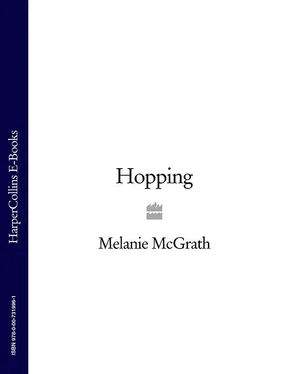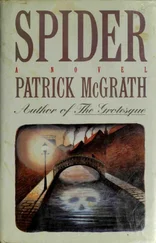1 ...6 7 8 10 11 12 ...19 By five their chores were done and they sat on the grass outside, which was long, unlike park grass, and ate jam sandwiches and drank hot tea. Franny asked whether they were having a picnic and Daisy said they were but then Franny said her sandwich tasted of grass and began to cry.
Tired, overexcited , said Mrs Shaunessy, carrying Franny into the hut and shooing the older children off to play.
Lilly took Daisy along a pathway that ran into the wood beside the huts. There were fairies there, she said – she knew because she’d seen them. Light fell through the leaves and lit the path with little sparkles. The stillness and quiet inside the woods were so peculiar and so daunting, Daisy had to keep blinking to make sure she wasn’t caught in some odd dream. A thousand ideas flipped through her mind. They walked in silence for a while, reaching the edge of the wood and skirting a field. How many trees were there? Daisy wanted to know. Had Lilly ever counted them? Did the fields go on for ever or was it possible to reach their end? Why did the wind blow so fiercely and everything move? What was the point of houses that stood on their own? But Lilly only answered her with a shrug.
That’s just the way the country is, innit?
They emerged from the wood into an area of rolling fields, their brows studded with copses and with orchards and hop gardens nestled in the more sheltered places. Here and there they could see the bright painted cowls of oasts.
Daisy cast her eyes around the scene. The wind had died down now and nothing moved. She thought of the men in uniform heading for the docks, of Old Pigswill and the policeman shouting into his megaphone and her mother, in an asylum somewhere, at war with herself.
It’s all right here, ain’t it? Lilly said.
Daisy didn’t answer because she didn’t know.
By the time they returned to the huts, the air had begun to darken. The hoppers were already lighting smoky paraffin lamps and the sound of singing rose up in the sharp, leafy air and tangled in the trees. The two girls separated, each returning to her party. Nell was still sitting on her log and someone had studded the fire with roasting potatoes. They drank a cup of cocoa and sat round the embers listening to the adults gossiping. By the time Mrs Shaunessy packed them off to bed there were stars in the sky and in the branches of the trees bats were stirring, waiting to begin their night-time journeys.
From inside the hut, they could still hear the noise of laughter and singing. Franny fell asleep almost immediately but Daisy lay awake for a while, her sister’s breath warming her neck. She felt strange, expanded somehow, and wondered whether this was what happened in the country – there was so much space that you had to grow to fit it. Gradually, though, the extraordinary events of the day began to drift off and she felt her breathing deepen. It was still dark when she was woken by Franny’s little hands prising open her eyes. From outside came a faint panting sound and a tap-tapping. Sufficient moonlight filtered through the gaps in the boards to give Daisy a dusty impression of the interior of the hut. Old Nell was lying next to them, now, asleep, and on the palliasse beside lay Mrs and Billy Shaunessy.
I don’t like it here , Franny whispered.
Daisy held her younger sister and stroked her head.
Ssh. Tomorrow I’ll take you to where the fairies live .
I don’t want to see the fairies , Franny said, I want to see the toffee apple man .
When they next woke it was only half dark in the hut. Daisy thought she heard a man shouting, then his voice became fainter. Nell was no longer lying beside them and the smell of wood burning drifted in from outside. Daisy pulled on her clothes and boots and went out. It was only half light but already Alfie had a fire going and Mrs Shaunessy was busying over it with a tea kettle. The grass was hung with white cobwebs. Down by the long drops rabbits scudded along the fringes of the woods, their bobtails bloody with the sunrise. Daisy returned to the hut, woke her sister and helped her to dress, and Mrs Shaunessy set down a breakfast of bread and marge and warm milk, but Franny pushed hers away, saying she couldn’t eat with the trees watching.
After breakfast the girls followed old Nell, Alfie and Joan, and Billy and Mrs Shaunessy out of Pheasant Field, and along a small flinty lane and past another row of huts that Mrs Shaunessy referred to as the Dovers, because the pickers from Dover were staying there, to the dip that marked the boundary between Big Kit and Old Ground. Here, there was a fence of wide stakes which acted as a windbreak – Mrs Shaunessy called it a Poll Loo – and beyond the Poll Loo Daisy became aware of a great swell of talk and song and they found themselves at the entrance to a sort of country factory whose walls were made of leaves. Here dozens, maybe hundreds, of families milled about, laughing and chattering, and there was a slightly nervy, competitive air, which reminded Daisy of Chrisp Street market at half past seven in the evening, just before the costermongers began reducing their prices. Many of the families carried paraffin stoves, baskets of food and jars of tea, and most seemed to have covered themselves with sacks or heavy aprons. Among the throng, Daisy recognised Lilly, who waved and gesticulated. Then Mrs Shaunessy drew some sacks from her bag and, ignoring Franny’s protests, she began tying them round the girls with lengths of string, before covering herself. Not long afterwards, a man arrived on a chestnut horse and opened the gate and the women and children surged forward, elbowing and pushing anyone who got in their way.
Hold hands and don’t lose me , shouted Mrs Shaunessy, but this was easier said than done in the general scrum, and even though Daisy and Franny were used to crowds, even though they wandered daily through the most overcrowded alleys and rookeries in a fiercely overcrowded city, it was as much as they could do to keep themselves from being heaved upwards by the crowd and flung down and trampled.
The leaf factory was divided into long alleys marked by a kind of high fencing of poles and wire, along which the hop bines curled upwards to a height of 20 feet. Men were moving about directing families down the passageways, at the ends of which sat huge baskets. Up ahead they saw Alfie waving and shouting.
This is our drift .
Mrs Shaunessy turned to the two girls and through the din signalled them to wait and not do anything until Billy showed them how to pick. Not long afterwards, the man on the chestnut horse drew a large handbell from his saddle pouch. At the sound of the bell, a roar rose up from the crowd of the sort that Daisy had only ever heard before outside the football grounds, as hundreds of women and children dived as fast as they could into one or other of the green alleys, shouting and jostling. Alarmed, Daisy followed Billy, dragging Franny behind her as Billy elbowed his way inside the alley. The air suddenly felt dense and musty. Sprinkles of sunshine fell from the roof but otherwise the only light came from the now distant ends, and when her eyes had adjusted, Daisy saw Billy standing beside them with a thin twine in his hands, from which soft leaves flapped, like pieces of brushed cotton. Between the leaves hung bunches of papery grey-green buds. Billy dropped on to a piece of sacking. With his left hand he held fast on to one end of the twine, then quickly he ran his right hand along the bine, applying force whenever he reached a bunch of cones.
Strip and pinch, strip and pinch. See? There ain’t nothing more to it than that .
When the bine was stripped and the cones had accumulated in a dip in the sacking, he gathered them up and threw them into an upturned umbrella that sat between himself and the spot where his mother stood, pulling down the cut ends of bines from the high wire around which they were entwined, then he grabbed another bine and began to repeat the procedure.
Читать дальше












